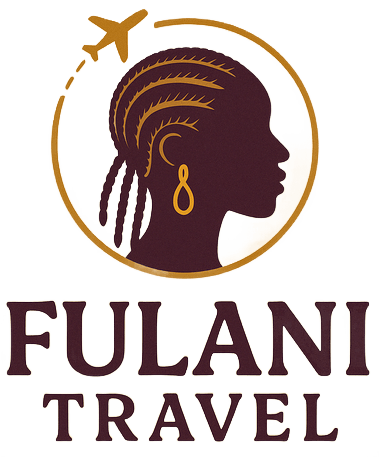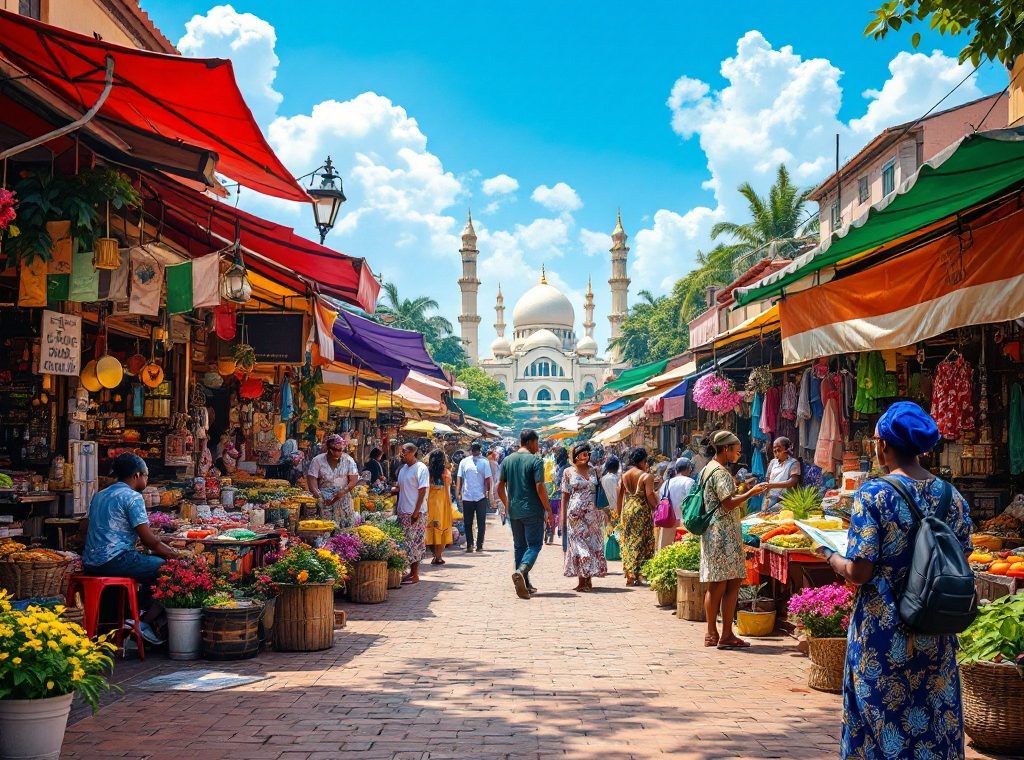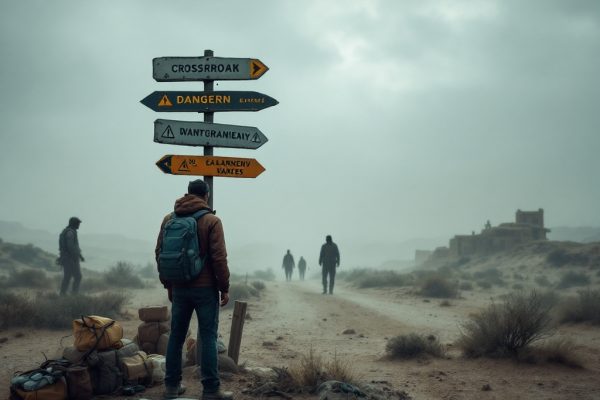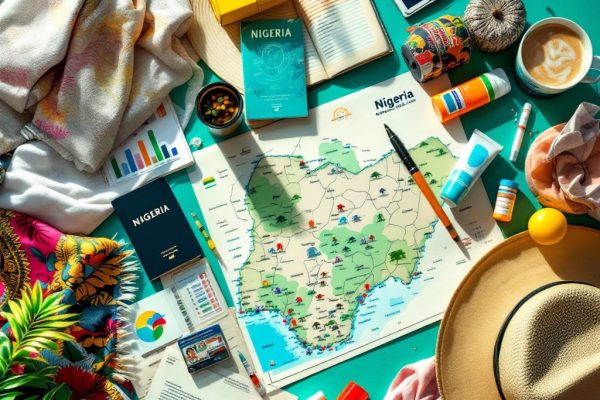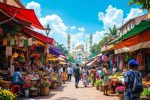Nigeria Travel Safety Tips: Areas to Visit and Areas to Avoid
Planning a trip to Nigeria? While the country offers rich culture and attractions, serious security risks like terrorism, kidnapping, and crime require careful consideration. This guide provides essential safety information, from understanding high-risk areas to practical tips for navigating cities and transportation. Prioritize your safety by learning how to mitigate risks and ensure a secure journey. Discover how to travel smart in Nigeria.
Important information
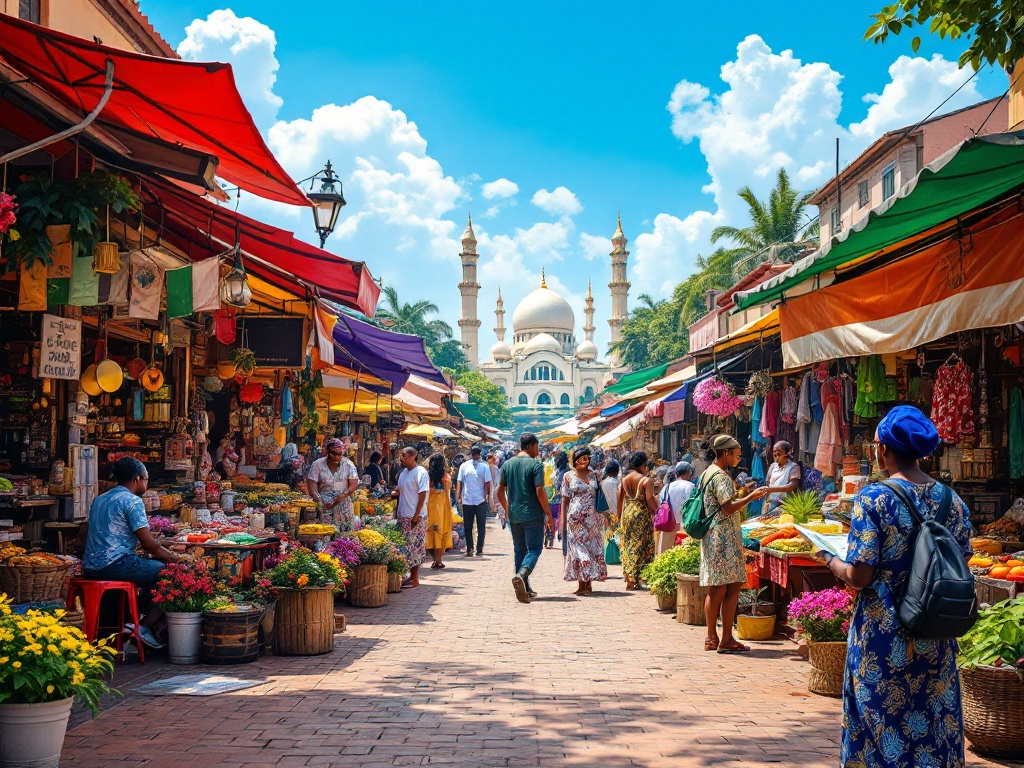
- Reconsider non-essential travel to Nigeria due to risks of terrorism, kidnapping, and crime.
- Avoid states like Anambra, Kogi, Abia, and Edo due to high crime rates. Northern states like Kaduna, Kano, Katsina, Sokoto, and Zamfara also pose significant risks.
- If traveling, be vigilant, avoid displaying valuables, and use reputable transportation. Travel with a local guide for enhanced safety, especially outside major cities.
- Register with your embassy upon arrival and share your itinerary with a trusted contact.
- In emergencies, dial 112 or 199. Travel insurance with medical evacuation is highly recommended.
Nigeria Travel Safety Overview
Traveling to Nigeria requires careful planning and heightened vigilance due to safety risks such as crime, terrorism, kidnapping, and civil unrest. Reconsider non-essential travel. If travel is unavoidable, prioritize your safety by following these guidelines:
Be aware of your surroundings at all times. Avoid demonstrations and exercise increased caution, particularly in high-risk areas.
Protect your belongings and avoid traveling after dark. Choose accommodations with robust security measures.
Carry copies of your identification and share your itinerary with someone you trust.
Stay informed about local news and heed the advice of local authorities. Maintain a supply of essential provisions like food and water, and develop emergency plans.
Consider enrolling in travel safety programs and reviewing Nigeria-specific security reports. Utilize government resources and advisories.
Connecting with local contacts can provide valuable real-time safety updates, including alerts about local disturbances.
While social media can offer safety alerts, remember that the information isn’t always reliable.
Understanding the Risks
Nigeria faces a substantial risk of terrorist attacks, which can occur without warning. Popular tourist destinations are often targeted.
Kidnapping is a widespread danger, even in major urban centers like Abuja and Lagos.
A trip to Nigeria should be reconsidered given these serious security concerns.
Travel Advisories and Recommendations
Safety is your top priority when traveling to Nigeria. Reconsider non-essential travel due to the significant risks of terrorism, crime, and kidnappings. These threats are real and require vigilance. Stay informed about local conditions by monitoring news outlets and government advisories, as the situation can change rapidly. Avoid travel to Northern Nigeria entirely, and exercise increased caution in other areas. Upon arrival, register with your embassy and keep emergency contacts readily available. Careful preparation and constant awareness are key to a safe journey.
Crime and Security Concerns
Nigeria faces considerable crime and security challenges. Violent crimes, such as muggings and robberies, are common, especially in urban areas like Lagos and Abuja, particularly in crowded places. Kidnapping for ransom is a serious threat to both residents and tourists. Terrorist groups, including Boko Haram, are still active, mainly in the northeast. While civil unrest and inter-communal violence can occur, these are typically localized. Travelers should exercise caution, stay informed about local conditions, and be aware of their surroundings.
Safety Precautions for Travelers in Nigeria
- Avoid walking alone at night, especially in dimly lit or secluded areas.
- Be discreet with displays of wealth, such as jewelry or expensive electronics.
- Keep valuables secure and out of sight.
- Stay in well-lit and populated areas.
- Maintain awareness of your surroundings.
Staying Informed and Seeking Assistance
- Monitor local news and heed any travel advisories issued by your government.
- Register with your embassy or consulate upon arrival.
- Keep emergency contact information readily accessible.
- If you encounter any security issues, contact the local police or your embassy immediately.
- Consider using reputable security services if necessary.
Common Crimes: Muggings, Robbery, and Petty Crime
Crime is a significant challenge throughout Nigeria, affecting both urban and rural areas. Robberies and muggings are common, along with petty crimes such as pickpocketing and purse snatching, particularly in crowded areas like markets and public transportation. Travelers should be vigilant and take precautions to protect their belongings. Here’s how:
Be aware of your surroundings, especially in crowded places. Pay attention to who is around you and avoid distractions like using your phone while walking.
Secure your valuables. Keep your belongings close to you, preferably in a bag with a secure closure. Avoid displaying expensive jewelry or electronics.
Use reliable transportation. Opt for reputable taxi services or ride-sharing apps instead of unmarked vehicles. Be cautious of overly helpful strangers.
Stay in well-lit and populated areas, particularly at night. Avoid walking alone in poorly lit or isolated areas.
Report any suspicious activity to the police. If you witness a crime or feel threatened, contact local authorities immediately.
Terrorism Threats and Kidnapping Risks
trong>Terrorist attacks and kidnappings pose significant dangers throughout Nigeria, including major urban centers like Abuja and Lagos. These threats persist, so travelers should remain vigilant and aware of their surroundings.
Dealing with Nigerian Scams
Be cautious of unsolicited offers, especially in tourist-heavy areas like airports and popular attractions.
Confirm that any taxi you use is licensed and operates legally.
Keep your valuables hidden from view to deter theft.
Protect your personal information online and be wary of suspicious websites or requests.
If you find yourself in a concerning situation, seek assistance from your hotel staff or local authorities.
Areas to Visit in Nigeria
Nigeria’s rich culture and diverse attractions invite travelers to explore its wonders. Discover the Osun-Osogbo Sacred Grove, a UNESCO World Heritage site, or immerse yourself in the vibrant Calabar Carnival. For wildlife enthusiasts, Yankari National Park offers thrilling encounters, while families can enjoy Abuja’s National Children’s Park and Zoo.
Lagos and Abuja
Experience the electric energy of Lagos, with its vibrant nightlife on Victoria Island and the renowned hospitality of Lekki. Abuja, the capital city, offers a relatively stable environment, although vigilance remains important.
Calabar and the Niger Delta
Calabar, famous for its cultural festivals, presents a unique cultural experience. The Niger Delta, home to Port Harcourt, boasts natural beauty and cultural sites, but also requires extra caution due to security risks often linked to oil activities. Stay updated on local advisories and consider security arrangements before venturing into this region.
Cultural Highlights and Tourist Attractions
Explore Nigeria’s rich cultural heritage and stunning natural beauty. Discover Nigerian art and history at the National Museum in Lagos. Witness incredible wildlife at Yankari National Park. Experience the unique Sukur Cultural Landscape. Enjoy breathtaking views and invigorating hikes at the Obudu Mountain Resort. Immerse yourself in Yoruba culture at the Osun-Osogbo Sacred Grove, a UNESCO World Heritage site. Conclude your Nigerian adventure with the contemporary art scene at the Nike Art Gallery.
Recommended Cities: Abuja, Calabar, and Lagos
Nigeria offers a variety of travel experiences, with Abuja and Calabar standing out as popular destinations. Abuja seamlessly blends modern amenities with a rich cultural heritage, providing a unique and enriching experience. Calabar, known for its vibrant arts scene, offers a captivating journey into Nigerian creativity.
While Lagos holds significant economic importance, it’s crucial to be aware of the higher safety risks associated with this city. Consider these factors carefully when selecting your destination in Nigeria to ensure a safe and enriching travel experience.
Traveling Safely in Port Harcourt and the Niger Delta
Prioritize your safety in Port Harcourt and the Niger Delta. Consult local sources for up-to-date safety information.
Engage a trusted security service for enhanced protection. This can provide an additional layer of safety during your travels.
Minimize unnecessary outings, especially at night. Be cautious and aware of your surroundings.
Maintain a low profile and avoid displaying valuables. Refrain from drawing unnecessary attention to yourself.
Areas to Avoid in Nigeria
Traveling in Nigeria requires heightened vigilance due to regional security challenges. Terrorism and kidnappings are prevalent in Borno, Yobe, and northern Adamawa. Kidnapping risks extend to Bauchi, Gombe, Kaduna, Kano, Katsina, Sokoto, and Zamfara. The northwest (Kaduna, Kano, Katsina, Sokoto, and Zamfara), northcentral (Plateau, Niger, and Kogi), northeast (Adamawa, Borno, and Gombe), and the Niger Delta (excluding Port Harcourt) all present elevated risks.
- Borno, Yobe, and northern Adamawa: terrorism and kidnappings,
- Bauchi, Gombe, Kaduna, Kano, Katsina, Sokoto, and Zamfara: kidnapping risks,
- Northwest: elevated risks (Kaduna, Kano, Katsina, Sokoto, and Zamfara),
- Northcentral: elevated risks (Plateau, Niger, and Kogi),
- Northeast: elevated risks (Adamawa, Borno, and Gombe),
- Niger Delta (excluding Port Harcourt): elevated risks.
Southern Nigeria grapples with widespread crime and armed gangs. This is particularly true in Abia, Anambra, Bayelsa, Delta, Enugu, Imo, and Rivers (excluding Port Harcourt). Border regions with Cameroon, Niger, and northern Benin also pose safety concerns and should be avoided. The northeast, especially Borno and Yobe, faces ongoing insurgency. The Niger Delta, particularly near oil communities, experiences kidnappings and civil unrest.
- Abia, Anambra, Bayelsa, Delta, Enugu, Imo, and Rivers (excluding Port Harcourt): widespread crime and armed gangs,
- Border regions with Cameroon, Niger, and northern Benin: safety concerns,
- Northeast (Borno and Yobe): ongoing insurgency,
- Niger Delta (near oil communities): kidnappings and civil unrest.
Avoid travel to Anambra, Kogi, Abia, and Edo due to high rates of kidnapping, armed robbery, and communal violence. Kaduna, Kano, Katsina, Sokoto, and Zamfara in the northwest are also high-risk areas. These areas face threats of terrorism, kidnapping, banditry, and inter-communal conflict.
trong>Extreme caution is advised when considering travel to these regions.
Regions with High Travel Risk
Northeastern Nigeria, specifically Borno and Yobe states, faces a significant threat from terrorist groups. Travelers should exercise extreme caution in these areas.
The Niger Delta’s oil-producing regions, particularly Rivers State, are plagued by kidnapping and unrest. Rivers State is currently under a state of emergency.
While certain areas of Lagos, especially at night, have safety concerns, high-risk zones also exist in parts of Anambra, Kogi, Abia, Edo, Kaduna, Kano, Katsina, Sokoto, and Zamfara.
Travelers are advised to exercise caution throughout the country.
States to Avoid: Anambra, Kogi, Abia, Edo
Travel Advisory: Exercise Caution in Certain Nigerian States
Due to security concerns, including robberies and kidnappings, travelers are strongly discouraged from visiting the following Nigerian states: Anambra, Kogi, Abia, and Edo. These areas pose significant safety risks. Prioritize your well-being and avoid travel to these regions.
High-Risk Northern States: Kaduna, Kano, Katsina, Sokoto, Zamfara
Northern Nigeria, particularly Kaduna, Kano, Katsina, Sokoto, and Zamfara states, presents significant safety concerns. Ongoing security challenges in these areas make travel unsafe, and visitors should avoid them to minimize potential risks.
Safety Tips for Traveling in Nigeria
When traveling, be mindful of your surroundings and avoid displaying valuable items. Carry minimal cash, opting for a money belt or hidden pouch. Secure your valuables in your hotel safe. Refrain from walking alone at night, particularly in poorly lit or unfamiliar locations. If confronted by a robber, prioritize your safety and don’t resist.
Exercise caution when accepting food or drinks from strangers. Share your travel plans and estimated arrival times with someone you trust.
For safe travel within Nigerian cities, choose reliable transportation options. Pre-booked taxis or ride-hailing services are recommended, especially after dark. Before entering any vehicle, verify the driver’s identity and check the vehicle. Avoid unmarked taxis and stick to well-lit main roads, avoiding shortcuts.
Consider hiring a local guide, particularly when venturing outside major cities. A knowledgeable guide can provide valuable insights, navigate unfamiliar territories, and enhance your safety. Ensure your guide is licensed, experienced, and reputable. Discuss your itinerary and any safety concerns with them beforehand. Verify their credentials through trusted sources. A local guide can also enrich your cultural experience.
Personal Safety and Security Precautions
For safe and discreet travel, avoid displaying expensive jewelry, electronics, or cash.
Utilize anti-theft bags and hotel safes to protect your valuables.
In crowded areas, be vigilant against pickpockets.
Refrain from traveling at night, whether walking or driving, and vary your routes.
Exercise caution, particularly in areas frequented by other Westerners.
Steer clear of demonstrations and large gatherings.
Stay updated on local events through news outlets.
Enroll in the Smart Traveler Enrollment Program (STEP) to receive alerts.
Carry copies of your passport and visa, keeping the originals securely stored.
How to Navigate Nigerian Cities Safely
Prioritize route planning and consider safe zones when choosing your transportation. Avoid high-crime areas, especially at night. Opt for reliable services like taxis or ride-hailing apps instead of public transport. For added safety and navigation assistance, consider traveling with a local guide.
Traveling with a Local Guide
Traveling in Nigeria is safer and more enriching with a local guide. Their knowledge of risky areas and valuable local insights helps visitors navigate unfamiliar cities and regions. Local guides also facilitate communication, bridging cultural gaps and connecting travelers with safe transportation options. They are essential for a positive Nigerian experience.
Transportation and Travel Safety
Traveling in Nigeria requires careful planning and awareness of potential safety risks. Road travel can be challenging due to poor road conditions, inadequate traffic management, and crime. Avoid driving yourself and instead pre-book a reputable taxi service through your hotel or a trusted local contact. Avoid traveling at night. Public transport is generally not recommended for visitors due to safety concerns. When using taxis or ride-hailing services, inspect the vehicle and verify the driver’s license. Familiarize yourself with local traffic laws.Sea travel also presents security risks, including piracy and armed robbery. Exercise extreme caution, adhere to local authority guidelines, and choose reputable ferry operators. Avoid isolated areas and stay informed about maritime security alerts.For road trips, especially long ones, thorough preparation is crucial. Avoid traveling alone and consider joining a convoy for increased safety, particularly in high-risk areas. Ensure your vehicle is well-maintained and carry essential supplies like spare tires and extra fuel. Maintain contact with someone you trust and stay updated on road conditions and security alerts. While convoys offer better security, remain vigilant and anticipate potential delays.
Public Transport and Road Travel Advice
Traveling in Nigeria requires careful consideration of transportation options. Public transport poses safety risks due to reckless driving and poorly maintained vehicles. For safer travel within cities, use reputable taxi services. Pre-book taxis through your hotel or use ride-hailing apps, but always verify the driver’s identity before entering the vehicle. Avoid public buses and motorcycle taxis due to safety concerns. Intercity travel, by road or rail, also carries risks, including potential criminal activity. Opt for more secure transportation methods to prioritize your safety. Here’s a breakdown of safer travel practices in Nigeria:
Within Cities
- Use reputable taxi services.
- Pre-book through your hotel or use ride-hailing apps.
- Always verify the driver’s identity.
Intercity Travel
Exercise increased caution due to potential risks, including criminal activity. Consider safer alternatives like domestic flights or reputable private car services.
Safety of Maritime Travel in Nigeria
Sea travel in Nigeria requires careful attention to safety. Ensure your chosen vessel adheres to safety regulations for a secure voyage. Piracy poses a significant risk, particularly in the Gulf of Guinea, so remain vigilant.
Precautions for Road Trips and Convoy Travel
Traveling in Nigeria requires heightened safety awareness. Prioritize traveling in convoys and maintain vigilance throughout your trip. Avoid intercity roads and trains due to safety concerns; if these routes are unavoidable, enhance your security measures. Always keep car doors locked and refrain from using public transportation. For airport arrivals, pre-book transfers through a trusted contact or your hotel for added safety.
Emergency Contacts and Assistance
Your embassy or consulate is your primary resource for assistance during emergencies in Nigeria. They can help with lost documents, medical emergencies, legal issues, and other unforeseen circumstances.
Emergency Contact Information
For immediate assistance, dial the following emergency numbers in Nigeria:
- 112 (General emergencies)
- 199 (Connects to fire, police, and ambulance services)
Local Authorities
Local authorities can also provide rapid support in emergencies.
Consular Services and Support for Foreigners
Traveling abroad? Keep your embassy or consulate’s contact information readily available. They provide vital support in emergencies, such as replacing a lost passport, navigating legal issues, or managing medical crises.
Emergency Services and Local Authorities
In emergencies, dial 112 or 199 to reach ambulance, fire, and police services.
Keep essential contacts, such as local authorities and medical facilities, readily available.
Secure travel insurance that includes medical evacuation coverage for unforeseen circumstances.
Always adhere to local guidelines and remain calm during emergencies to ensure clear thinking.
